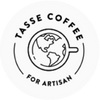Coffee roasting
Many students would ask us in class how roasters can roast green coffee beans to produce sweet, sour and bitter flavors, and thus write flavor descriptions for each different type of coffee beans?
Baking Art
During the coffee roasting process, different effects are produced on the sweetness, sourness, bitterness and other tastes of coffee.
🍩Sweetness
Origin: Ethiopian coffee beans usually have distinct fruity and floral aromas, while Brazilian beans have a sweet taste of nuts and chocolate.
Roasting degree: A longer drying and development phase evaporates more internal moisture, enhances the caramelization reaction, and thus increases sweetness
Freshness: Freshly roasted beans will generally have a more prominent sweetness, and make sure the beans are stored in sealed packaging that is protected from light.
🍋Sour taste
Origin: Kenya and ColombiaLunCoffee beans from Chile typically have higher acidity and bright, fruity aromas.
Altitude: Beans grown at higher altitudes tend to have higher acidity.
Processing: Sun-dried beans are generally more sour than washed beans because the beans absorb the sour flavor of the pulp during the drying process.
Roasting degree: Light roasting - retains and emphasizes the natural acidity of the beans; Medium roasting - retains a certain acidity while bringing out some caramelized flavors.
☕️Bitter taste
Soil and Climate: Certain regions of Brazil and Vietnam produce coffee beans that naturally have a stronger bitter flavor.
Harvesting method: Unripe green coffee beans will have a bitter taste. How to select and harvest coffee cherries of proper maturity is crucial to controlling the bitterness of coffee.
Dark Roast: When coffee beans are roasted to a dark roast, the sugar inside them will further break down and caramelize, resulting in a stronger bitter and smoky flavor. In addition, the protein in the coffee beans will also change, increasing the bitterness.
💡In summary
The roasting process has a profound impact on the flavor of coffee, and the degree, time and method of roasting will directly affect the sourness, sweetness and bitterness of the coffee.
In addition to the above factors, the true flavor depends on the origin: soil, climate and processing methods are all key.
For coffee lovers, constantly learning and adjusting roasting and brewing techniques is all about pursuing that perfect taste. Ultimately, finding the cup of coffee that’s right for you is the most important thing.
If you want to learn more about coffee roasting, you can visit our website for more details. The latest courses on coffee roasting and cupping are as follows:
1) Coffee cupping and roasting experience class
Through cupping, we can evaluate the flavor of coffee beans at different roasting degrees and understand the impact of roasting on the flavor of coffee. At the same time, the quality of coffee beans and the roasting method will also affect its flavor.
2) Coffee bean roasting experience class
Visit a professional factory to learn about the roasting process of coffee beans. You can roast the beans yourself and take them home to slowly brew them to continue your unique aroma. In addition to understanding the basic knowledge and concepts of roasting and understanding the operation of industrial roasting machines, you can also actually operate the machine and practice applying roasting curves. A sensory experience session is added to understand the diversity of flavors and select premium beans to take home.
3) UK TQUK Certification-Basic Barista Course
Based on other international courses, it has obtained the British TQUK certification, covering hand pouring, siphon, espresso,Latte Art, and five major roasting techniques, which are closer to the needs of general cafes. It allows you to experience different aspects of coffee at one time. It is worth enrolling whether you are an immigrant, starting a business, or simply want to learn about coffee.
4) SCA Coffee Certification Course-ROASTING SKILLS
The coffee roasting course is a must-learn course for students who plan to engage in coffee roasting in the future. It is a must-take program for the industry's top institutions. The course teaches everyone to have an in-depth understanding of the roasting process, learn the core techniques and equipment of roasting, and distinguish the flavor evaluation of different roasting degrees.
#DiscoverCoffee
#coffeestory
#coffeejourney
#Certificate Programs
#JapaneseCoffee




